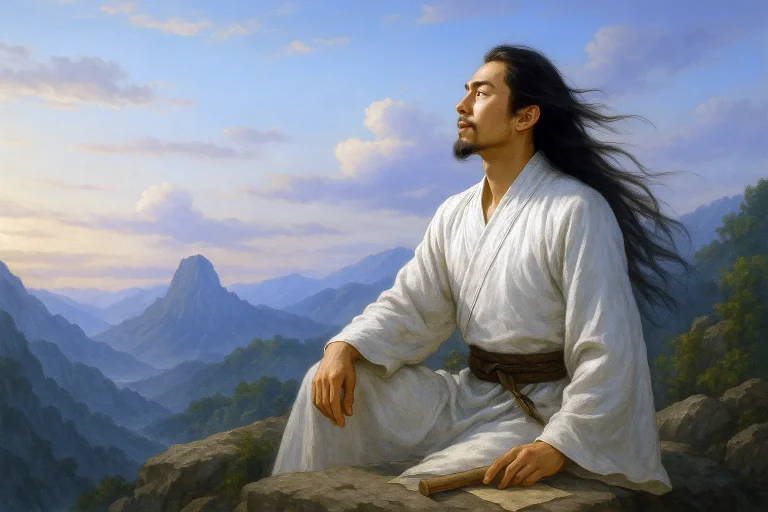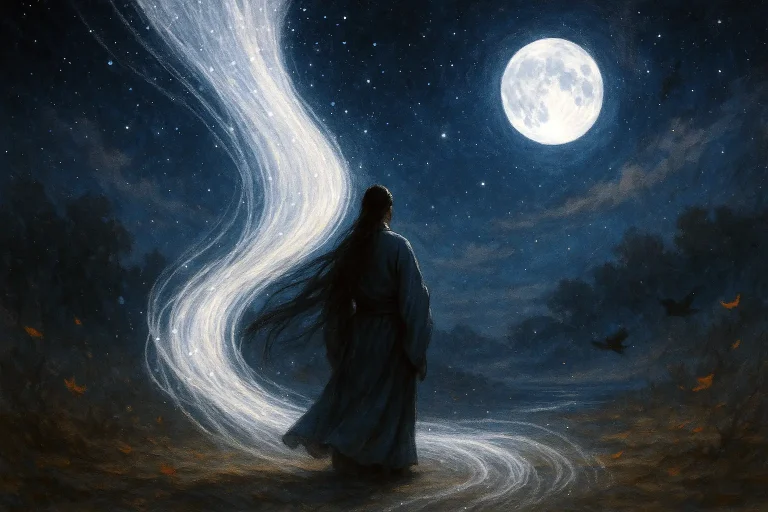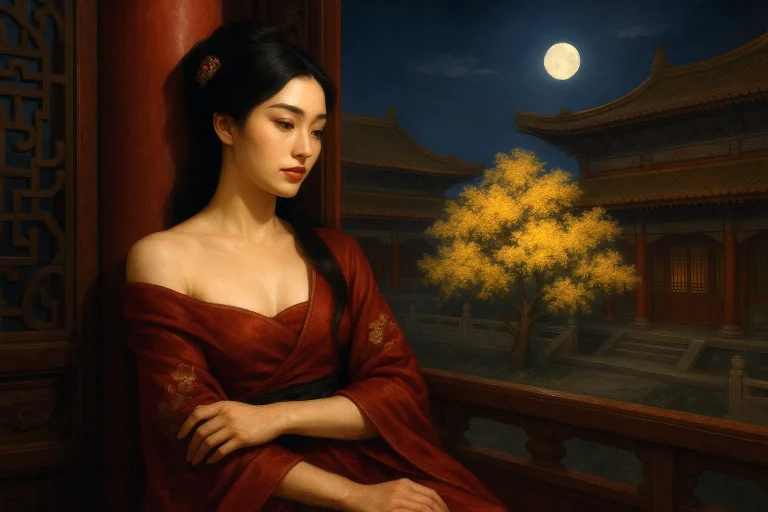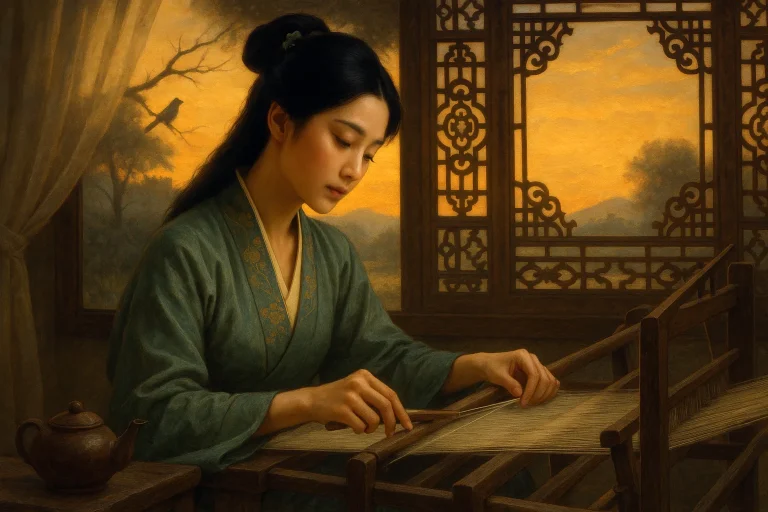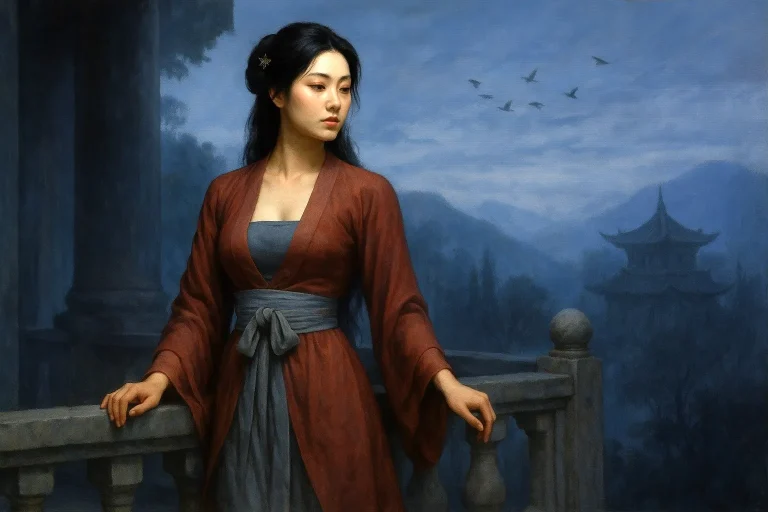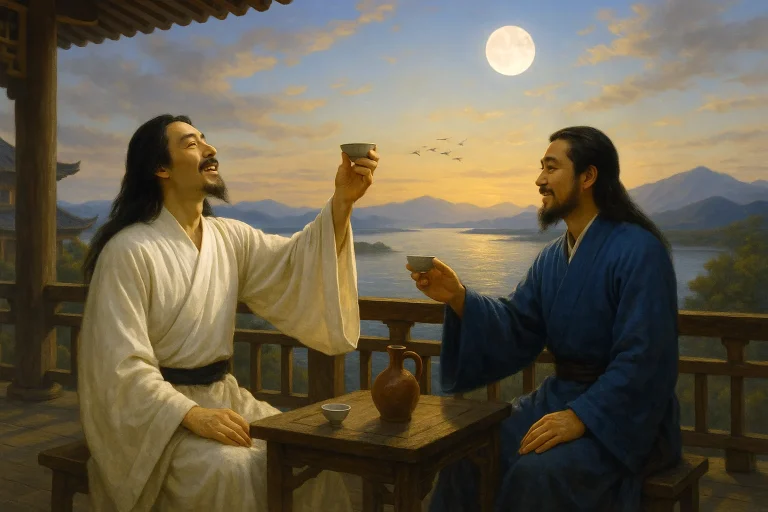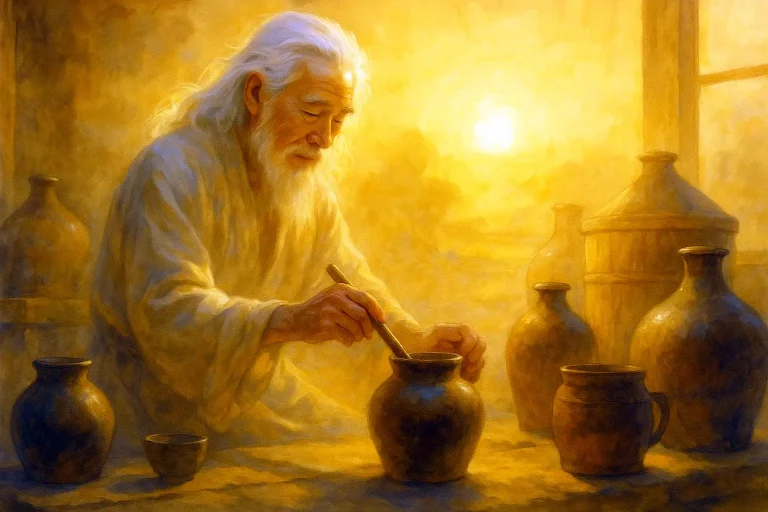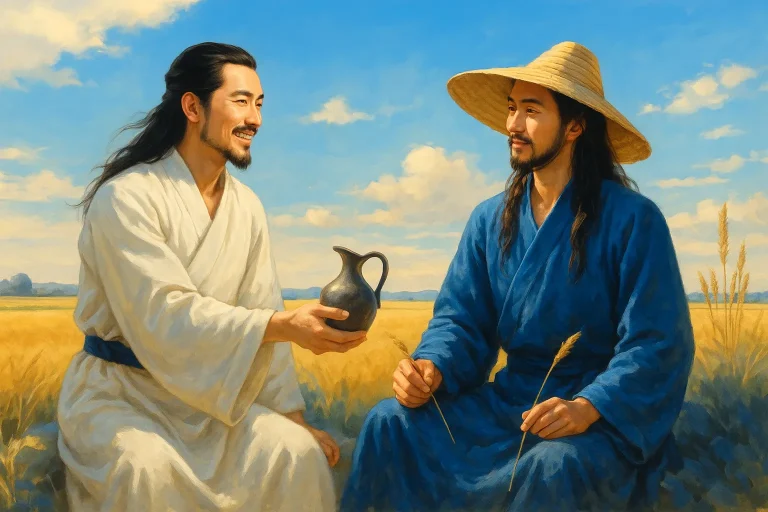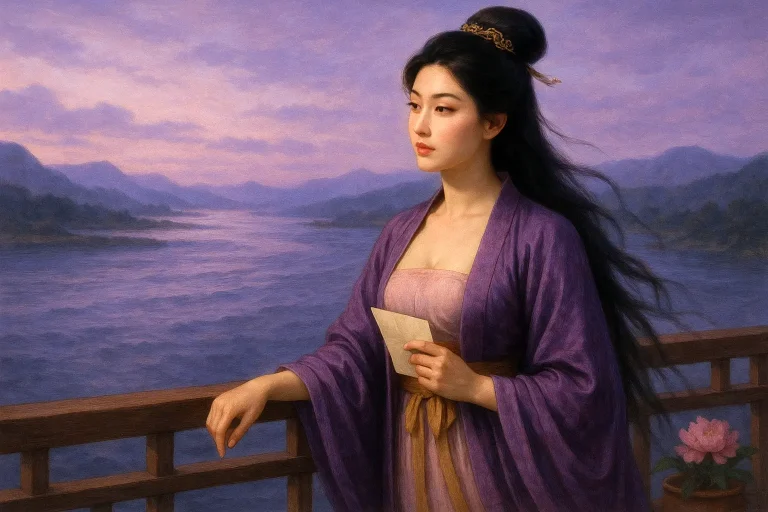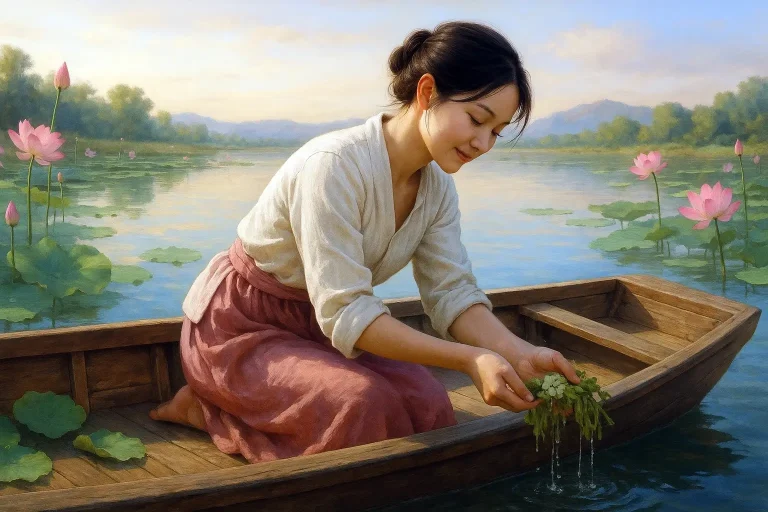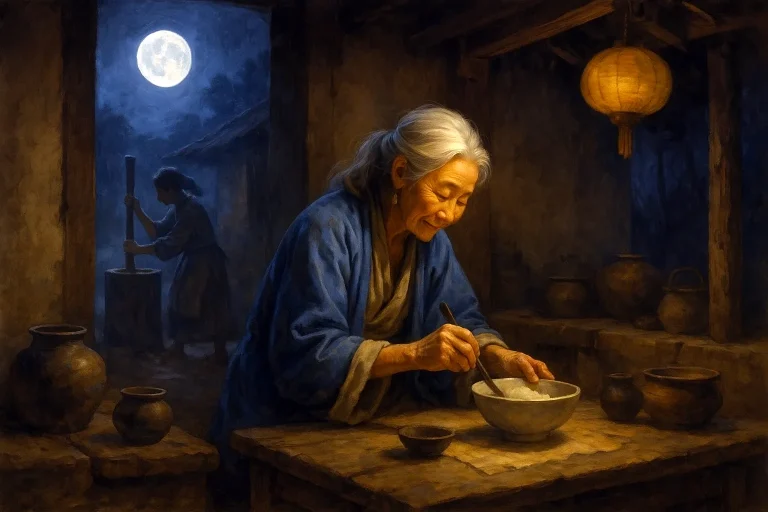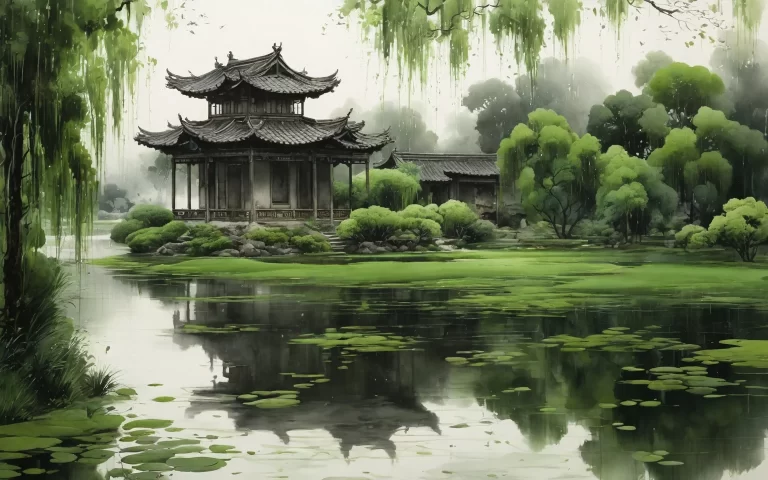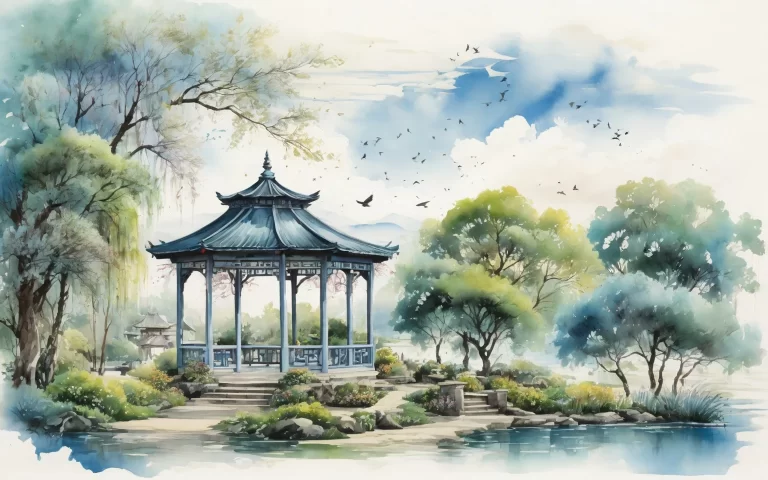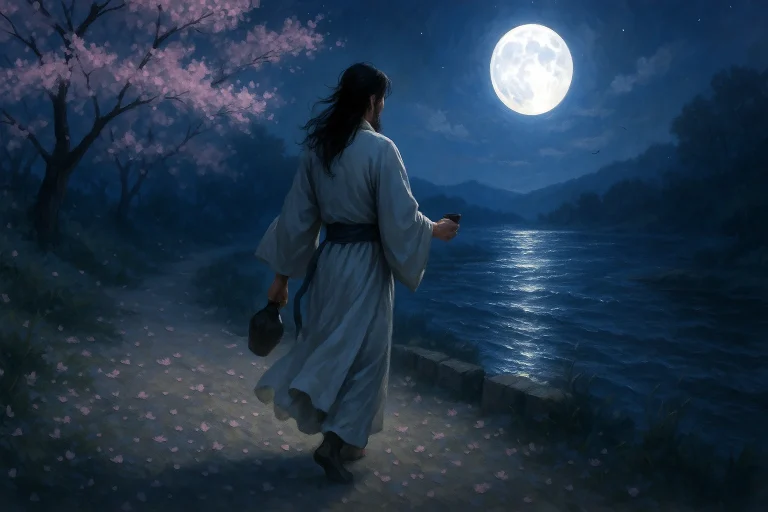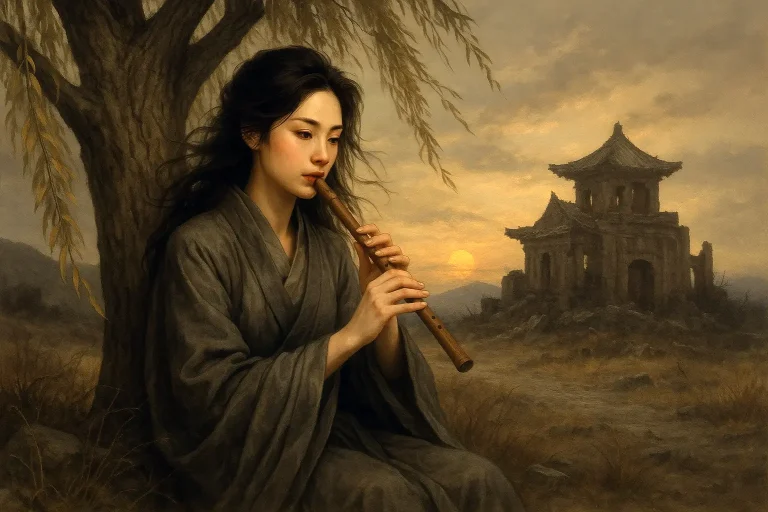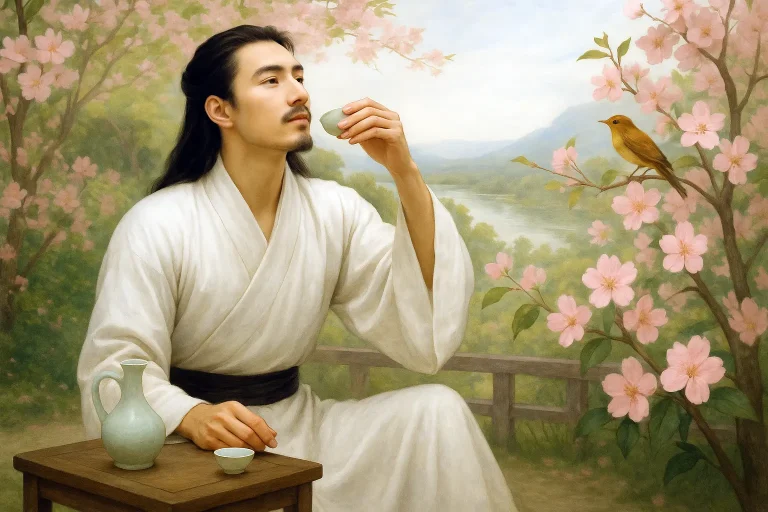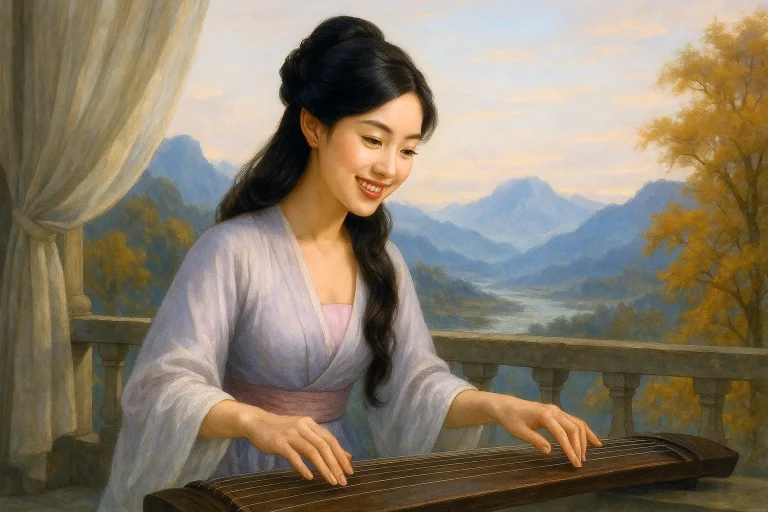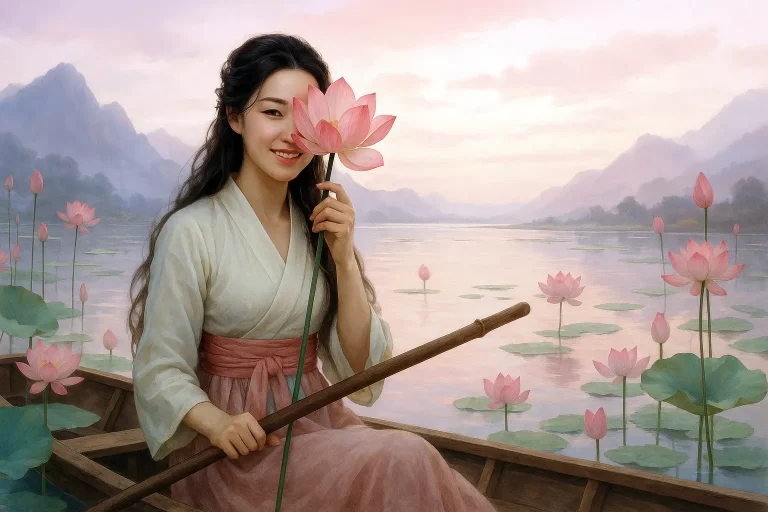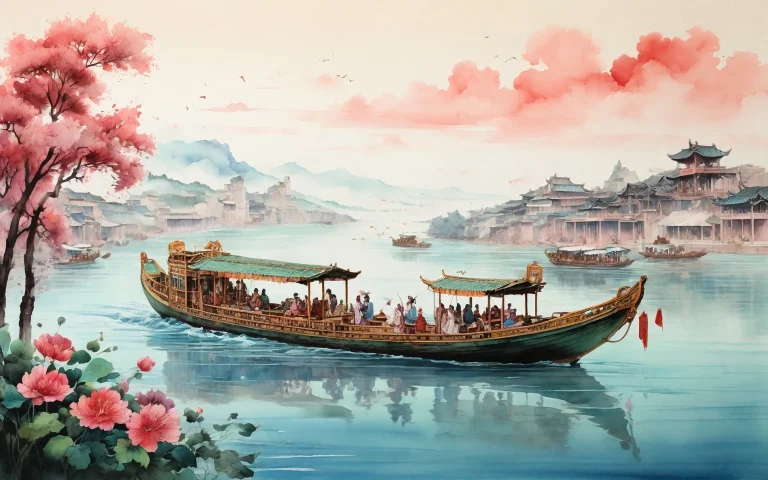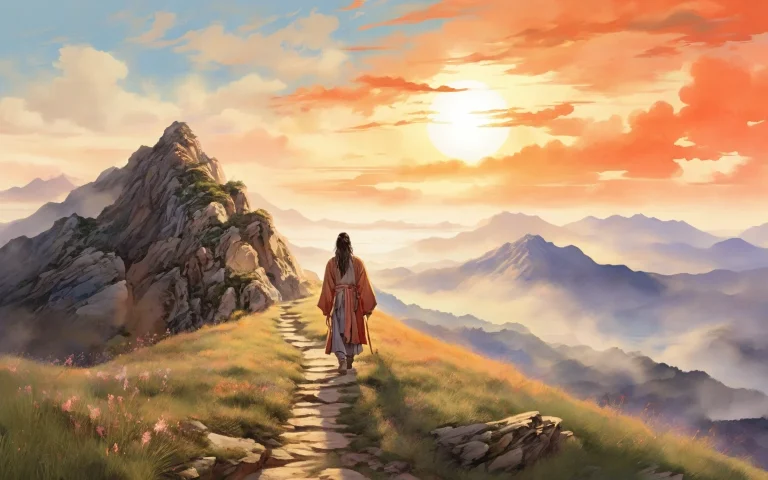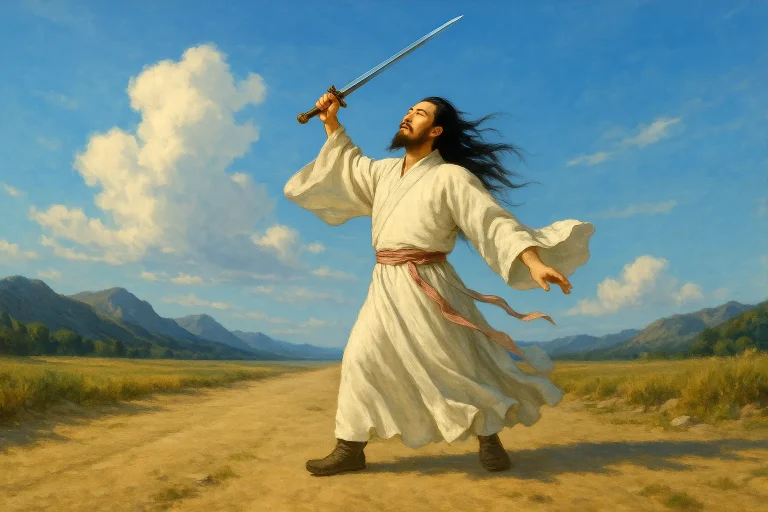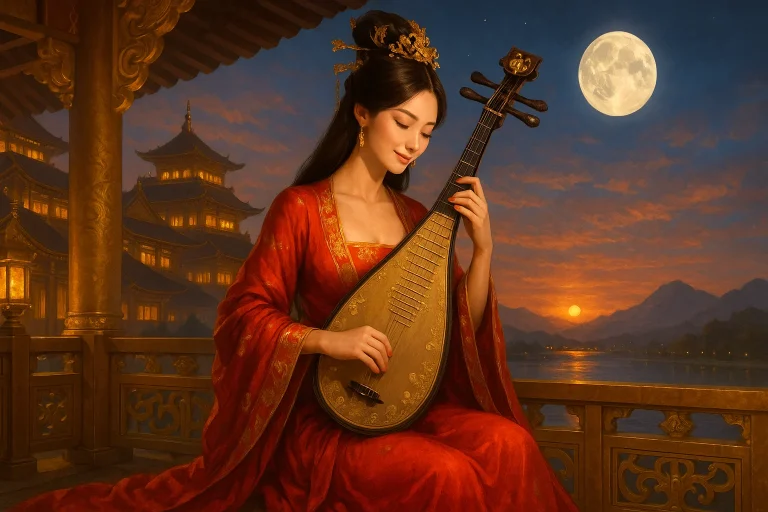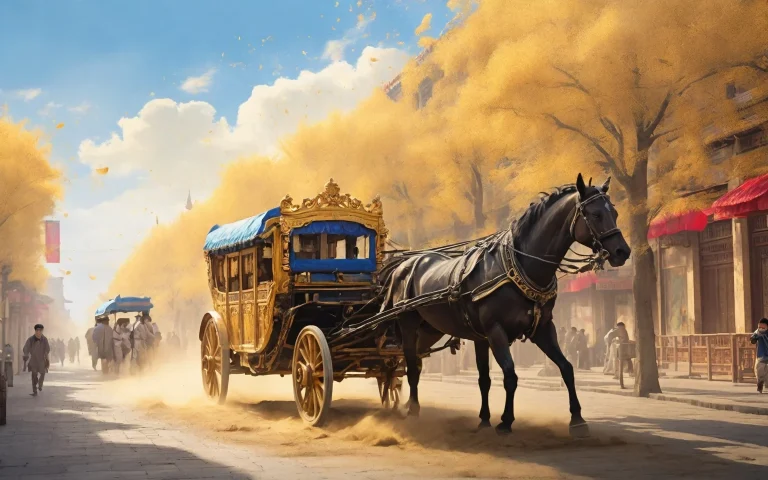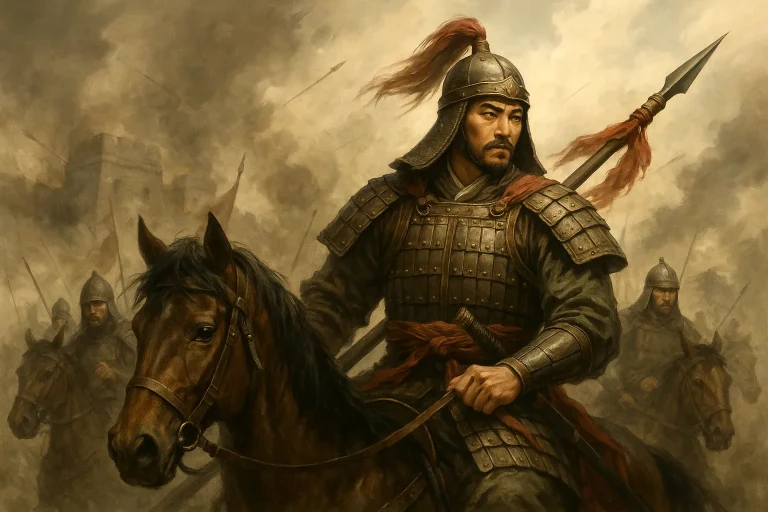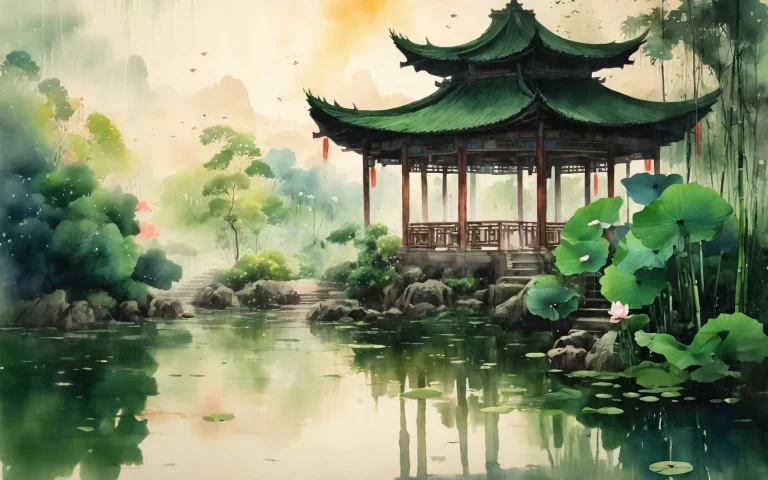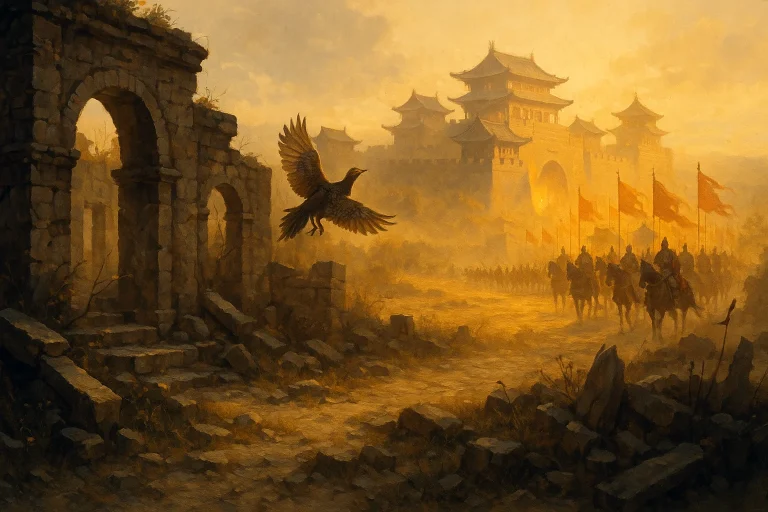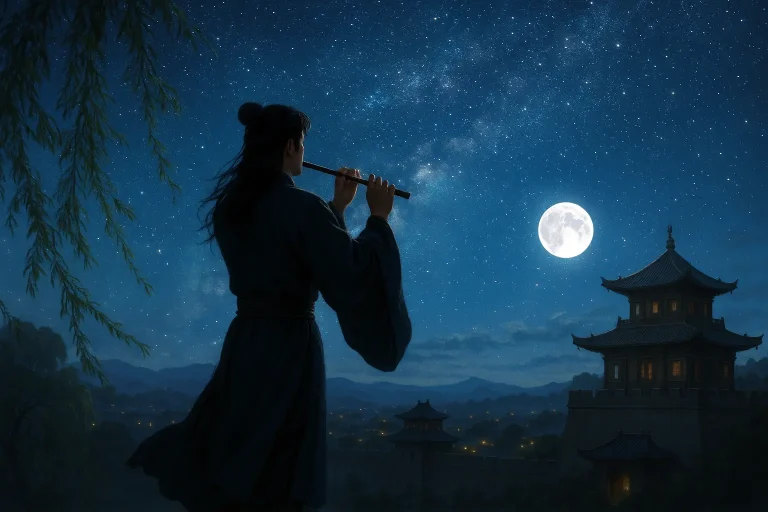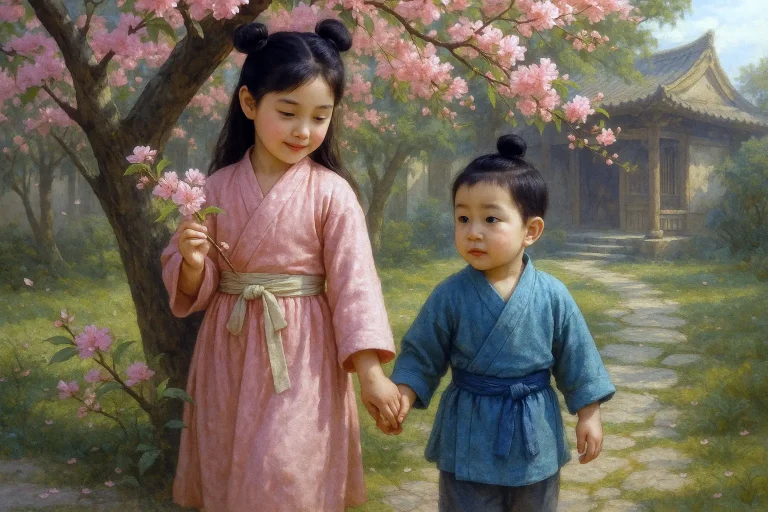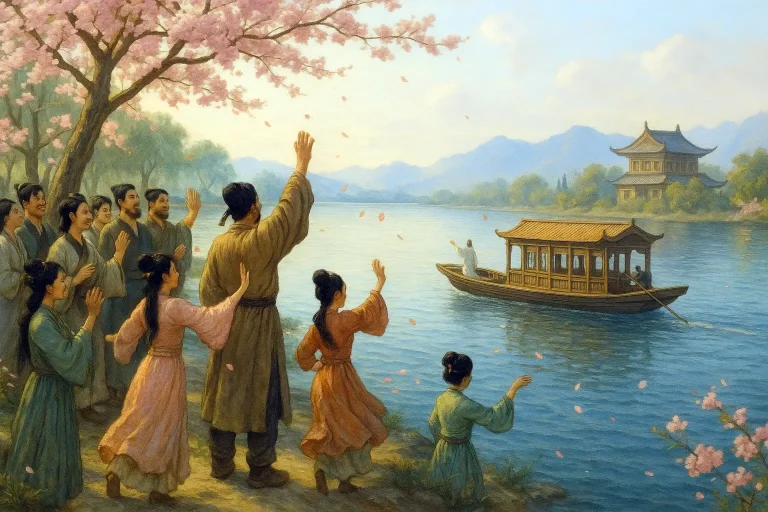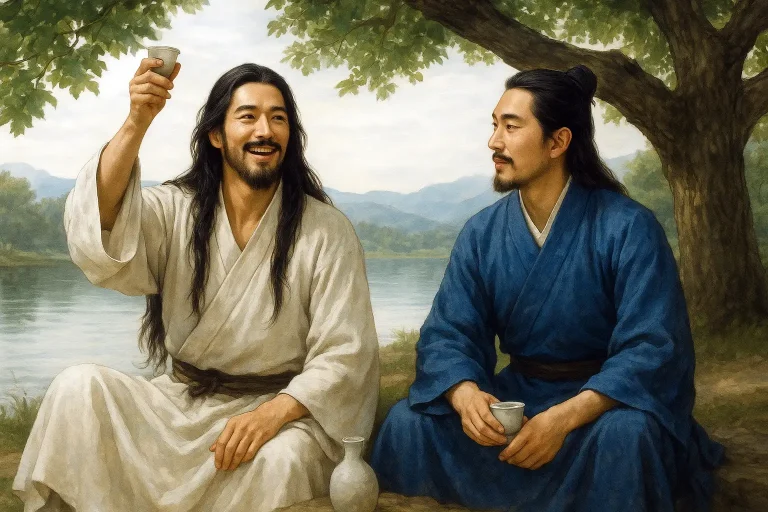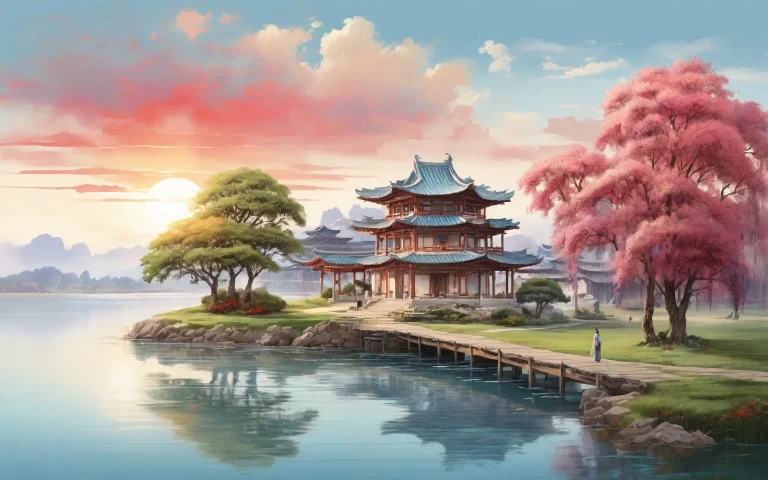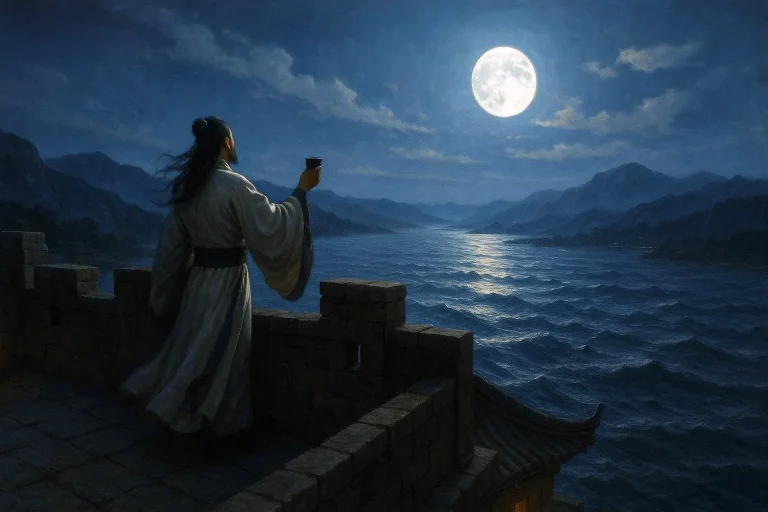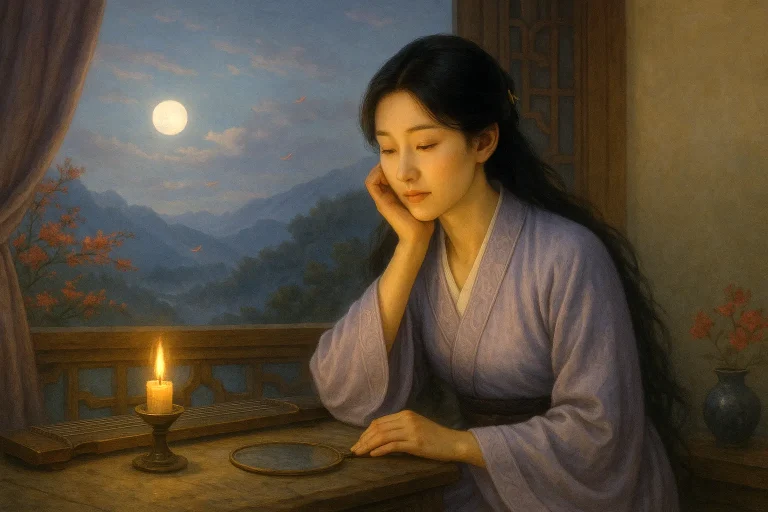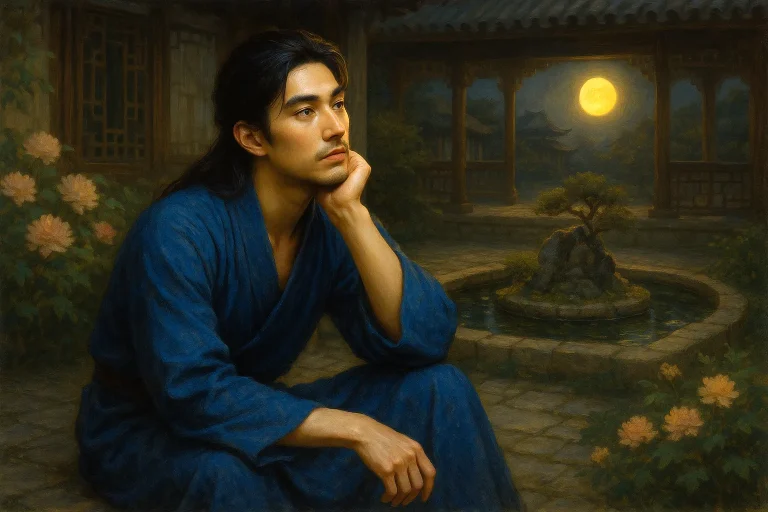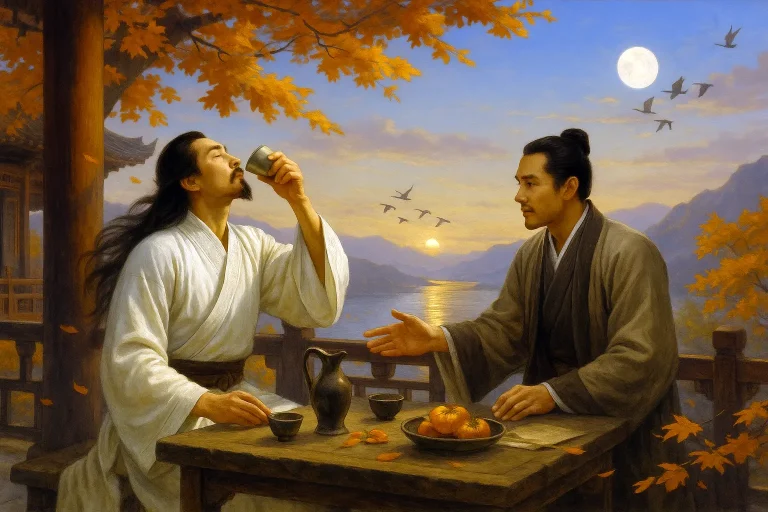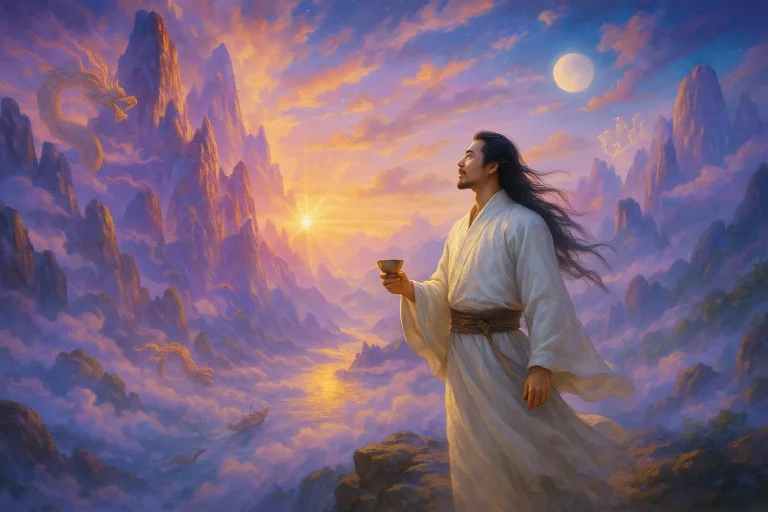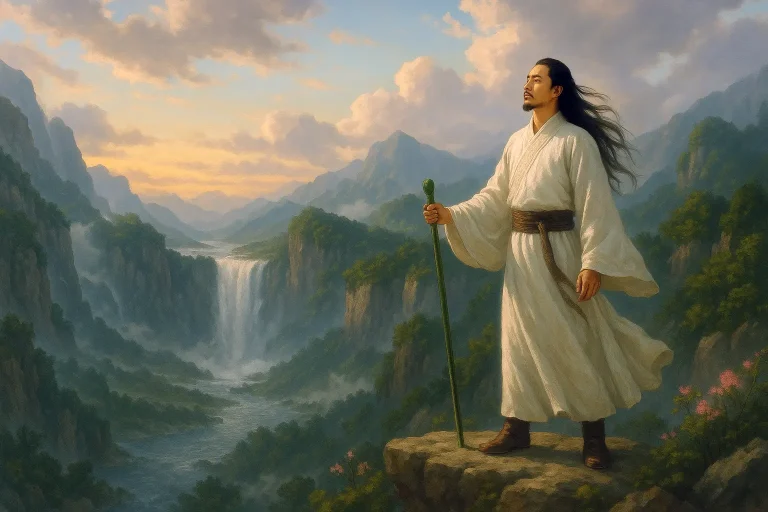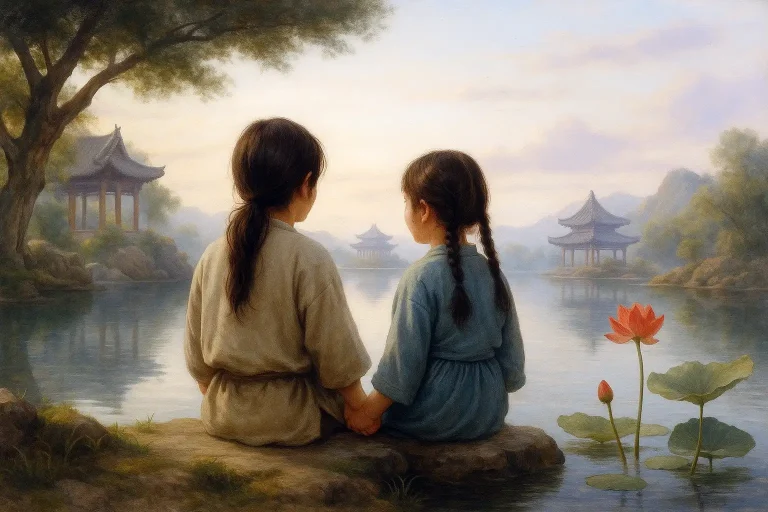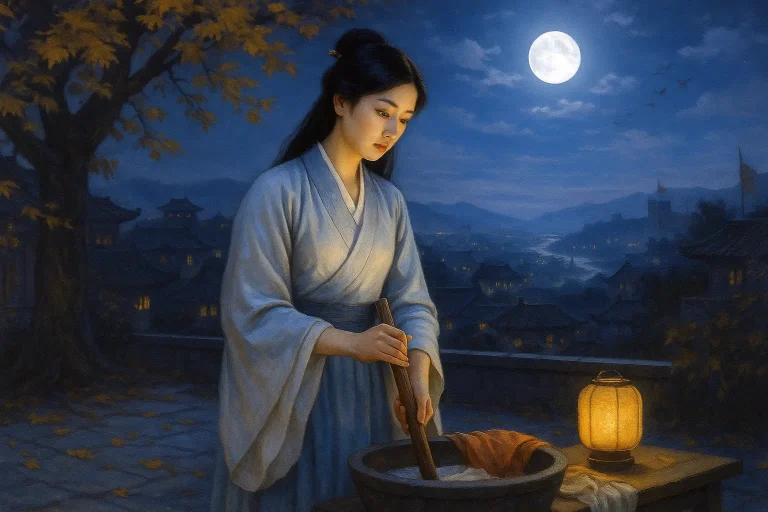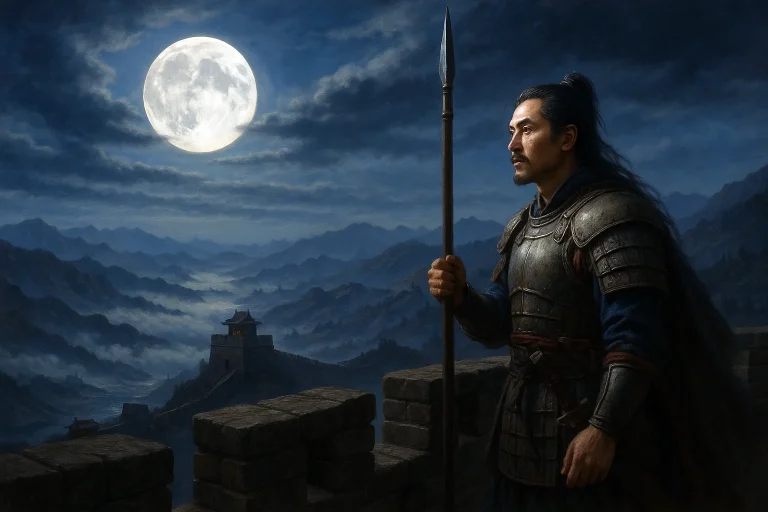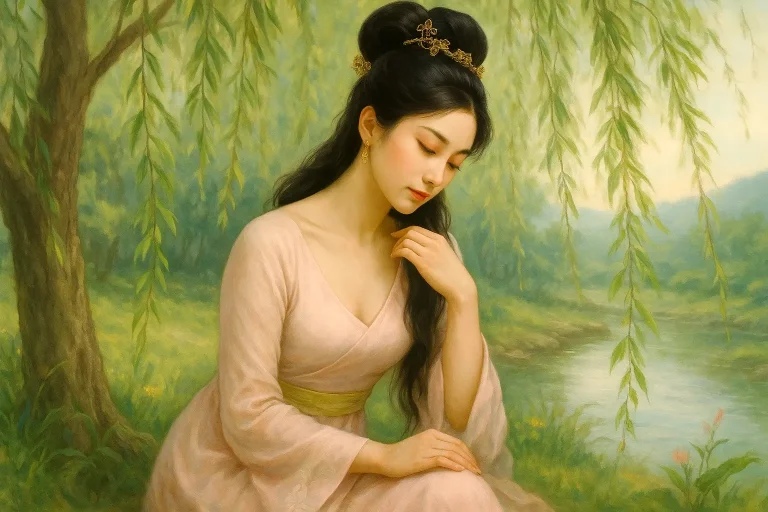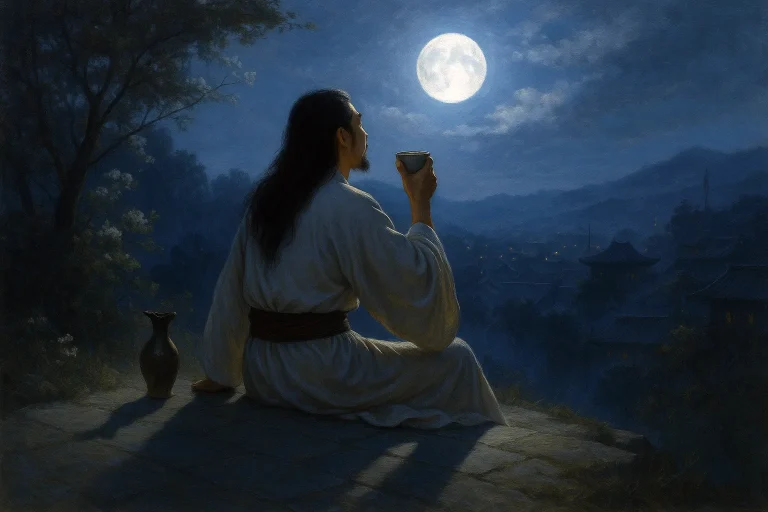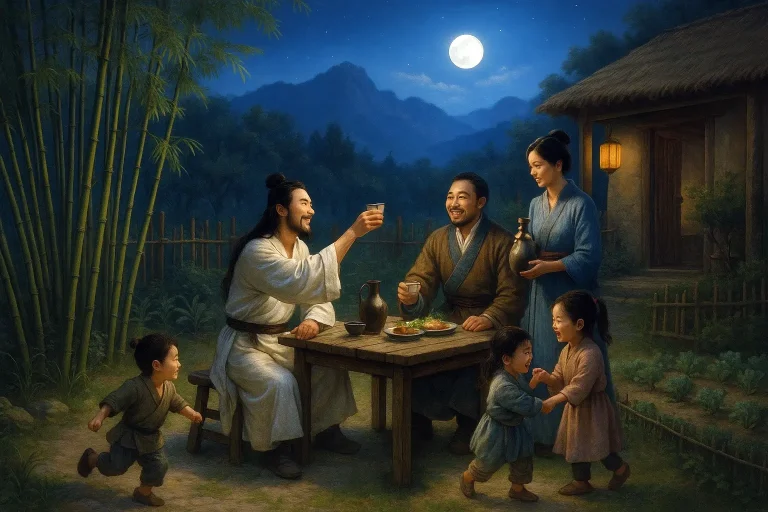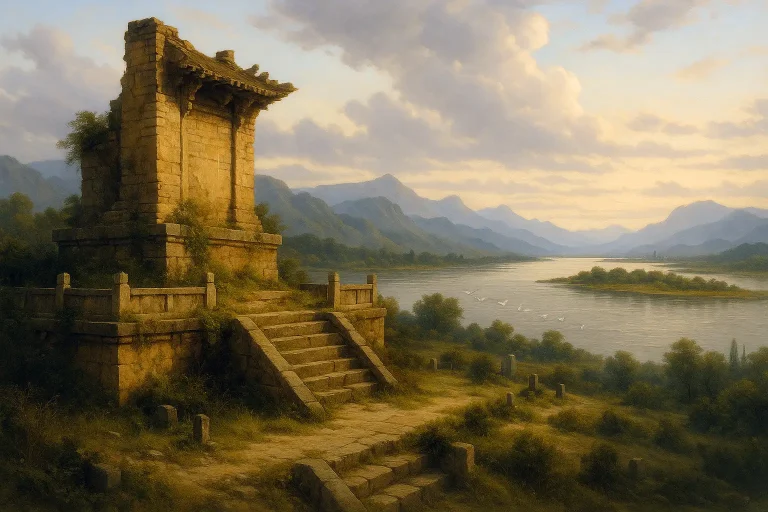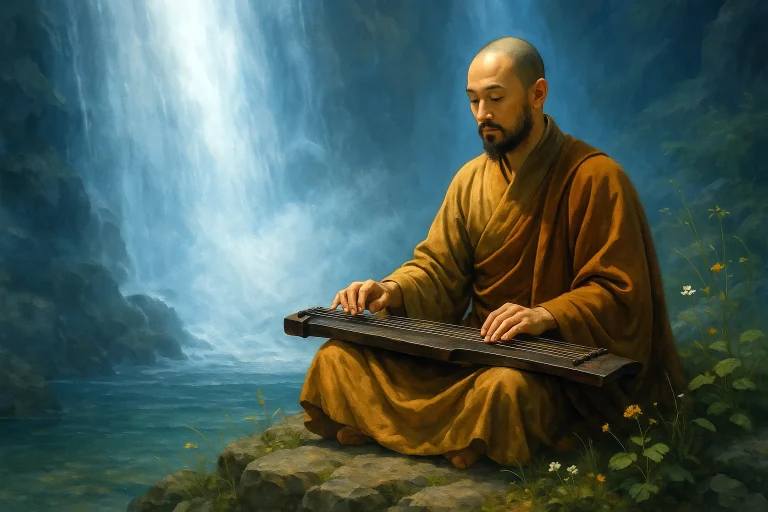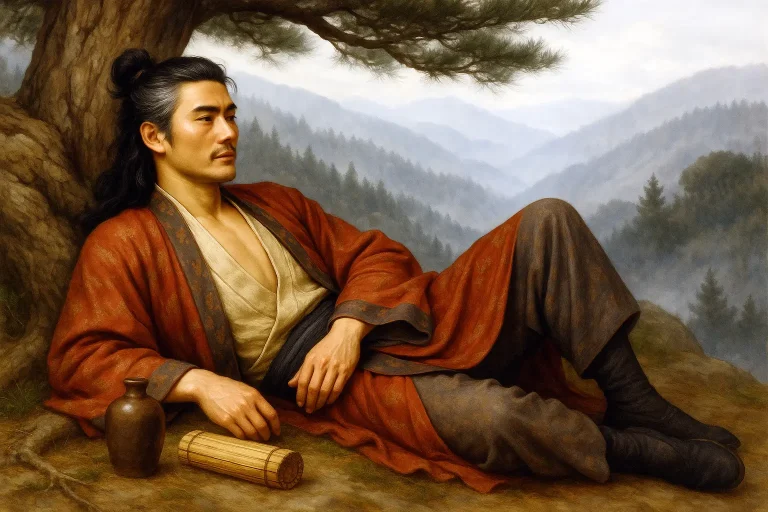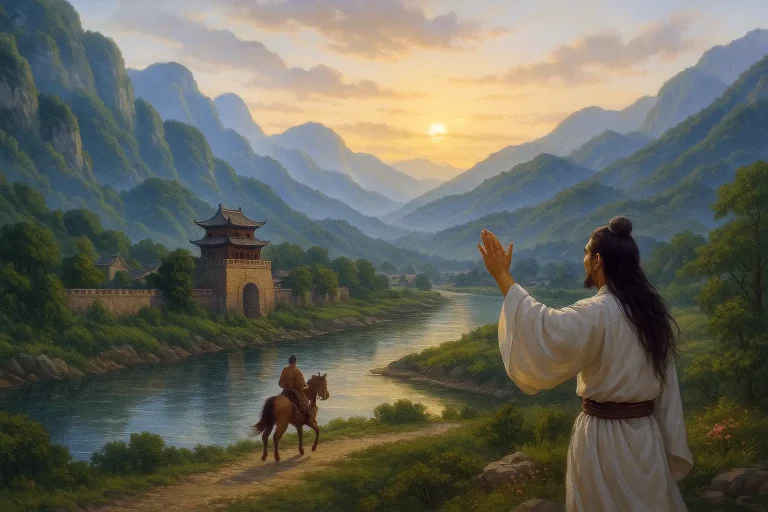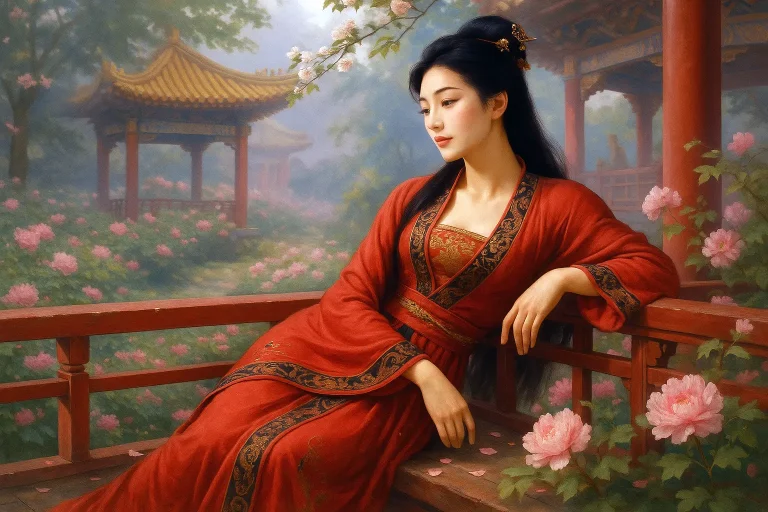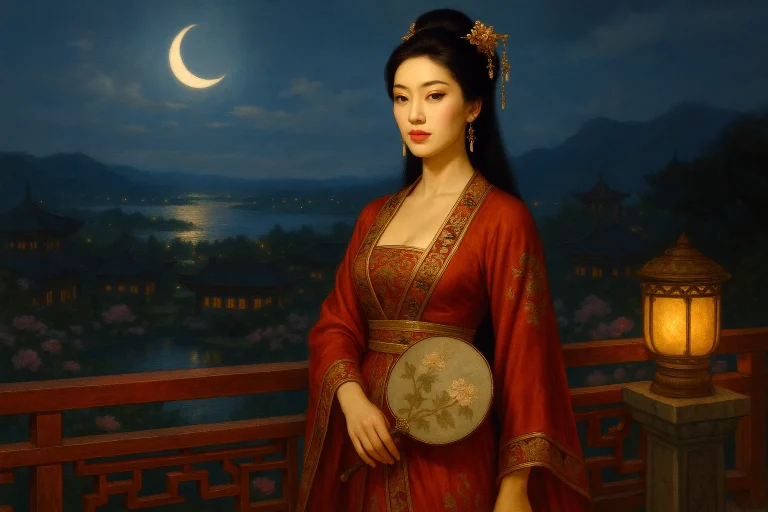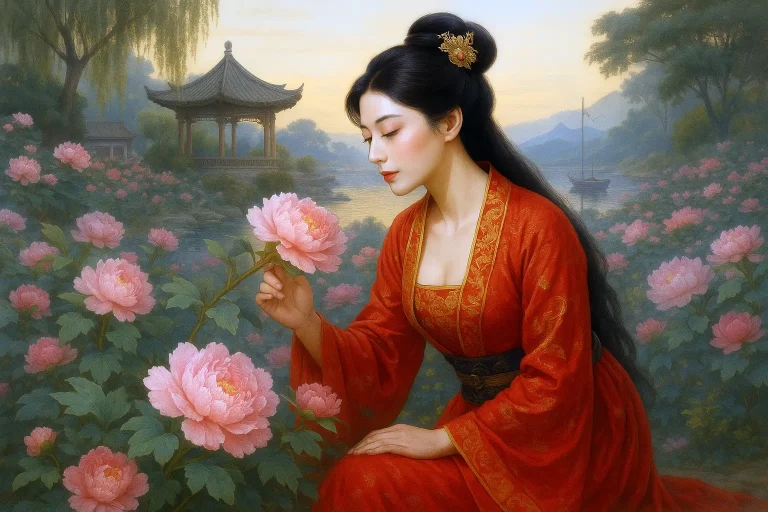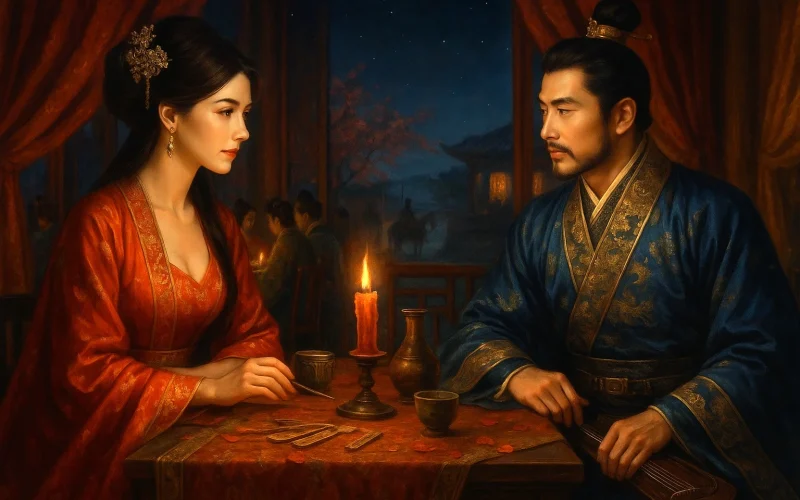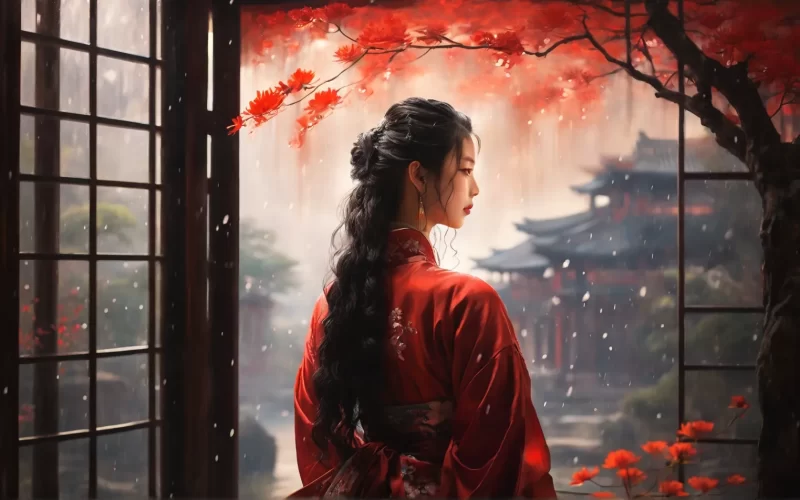Tang poetry is considered one of the brightest constellations in the history of Chinese literature, and one of the brightest stars is Li Bai(李白). Li Bai's ancestral home was in Gansu, and Li Guang, a general of the Han Dynasty, was his ancestor. Born in 701 A.D. and died in 762 A.D., Li Bai's life coincided with the dramatic period from the reign of the First Emperor to the reign of the An Shi Rebellion. The most intense contradictions in a society in transition from prosperity to decline were vividly embodied in the sensitive poet. Ideal and reality, hope and hopelessness, sobriety and confusion, entering and leaving the world, all kinds of contradictions are intertwined. Thus, in the nearly one thousand poems left by Li Bai, the desire to seek immortality and the ambition to build a career coexist.
李白
lǐ bái
The poet's spirituality determines the breadth and depth of his works, and different ideas influence Li Bai to different degrees, thus making his poetry rich and broad. In addition to the quest for immortality and the pursuit of a career, the plight of the people, the war at the border, the chivalrous spirit, and the scenic beauty of the mountains and rivers have also become an indispensable part of his works.
Li Bai's poems, especially the musical songs and lines and the five- and seven-syllable stanzas, take up a large part of the 300-odd poems selected for this book. The staggered lengths of the songs and lines are in keeping with Li Bai's free and uninhibited temperament, and the conciseness of the stanzas reflects his aesthetic characteristic of abandoning ornamentation and going deeper and deeper.
Li Bai pushed classical Chinese poetry, especially Romantic poetry, to its peak, and influenced generations of outstanding writers in China and abroad with his outstanding achievements. Han Yu, Li He, Ouyang Xiu, Su Shi, Lu You, Xu Wei, Huang Jingren, Gong Zizhen, Guo Moruo and Wen Yiduo, Matsuo Basho of Japan, and Pound and Eliot of the Western School of Imagery have all been infected and inspired by Li Bai's works.
Popular Poems
Main life story
Sichuan Period (705 ~ 726 AD)
When Li Bai was five years old, he followed his father and his family back to the area of Jiangyou County in Sichuan Province. There, Li Bai spent his teenage years.
As a teenager, Li Bai was exposed to a lot of cultural texts, and claimed that he "recited six books at the age of five or six, and viewed a hundred books at the age of ten". It is clear that he studied a wide range of subjects at that time. At the age of fifteen, he was able to write a very good article, and began to learn swordplay. When he was twenty years old, the famous writer at that time, Su Li, came to Shuzhong as an official, and saw Li Bai's works, greatly appreciated them, and thought that if he could work hard, he would be able to make great achievements in the future.
The natural environment of Shu is very beautiful, there are strange and majestic mountains and rivers, and there are also calm and beautiful wilderness, which makes Li Bai's eyes wide open, he was very young has travelled to Shu quite a number of attractions and monuments. He was also influenced by Taoism, which was prevalent in the Tang Dynasty, and interacted with many Taoist priests, and also met Zhao Lei, who was known for his love of talking about the art of vertical and horizontal, and lived together for a period of time, and Li Bai's political ambition was obviously influenced by Zhao Lei's influence. His extensive study, travelling and social contacts broadened his mind, nurtured his passionate and unrestrained thinking and character, and also sowed the negative ideological roots of his travelling to the world.
Few poems of Li Bai from this period have been handed down, and less than ten of them can be identified. Although these poems have not yet reached the realm of uniqueness, they have shown the poet's talent.
Wandering Period I (762 ~ 742 AD)
When Li Bai was twenty-six years old, he "left the country with his sword" and began to roam in the eastern part of his country. The so-called wandering was a means for Tang Dynasty scholars to increase their experience and make extensive contacts in order to gain reputation and achieve the goal of advancement. Du Fu, who was contemporary with Li Bai, also had a period of "magnificent travelling" in his youth.
After leaving the Three Gorges, Li Bai initially travelled to Jiangling and Wuchang in Hubei Province, Changsha and Yueyang in Hunan Province, and rafted on Dongting Lake. Then he travelled east, covering Nanjing and Yangzhou in present-day Jiangsu Province and Shaoxing in Zhejiang Province. Later, he travelled north again, arriving at Fangcheng and Linru in present-day Henan Province. Shortly thereafter, Li Bai travelled to Anlu in Hubei province, where he married the granddaughter of Xu Manshi, who had been a prime minister during the reign of Emperor Gaozong, and settled there for about ten years. During this period, in addition to living in Anlu for part of the time, he travelled to the areas of present-day Xiangyang in Hubei, Luoyang in Henan, and Taiyuan in Shanxi. After Li Bai turned thirty-five, he moved his home to the area of present-day Jining County in Shandong Province, where he still continued to travel north and south.
During the reign of Emperor Xuanzong of the Tang Dynasty, the Emperor was so obsessed with the pursuit of immortality that he advocated Taoism and visited famous mountain hermits. In 742 A.D., Li Bai went to Shengshan Mountain in Zhejiang Province to work as a hermit with the Taoist priest Wu Yun, who was recognised by Emperor Xuanzong in the same year and was called to Chang'an. Because of Wu Yun's recommendation, Li Bai was also summoned to Chang'an and began another phase of his life.
During this period, Li Bai's poetic art had reached maturity and he became a highly acclaimed poet of his time. His poetry absorbed the advantages of Chu Rhetoric and Lefu Folk Songs, with passionate feelings, rich imagination, free and unrestrained forms, and fresh and lively language, and formed an original style on the basis of absorbing the above advantages. Due to the complexity of Li Bai's thought, his works are often mixed with songs about the decadent life of indulgence and pleasure, as well as the idea of transcendence, which is a tributary, but it must be pointed out.
Chang'an Period (742 ~ 744 AD)
Li Bai arrived in Chang'an at the age of forty-two, and his official position was that of a minister of the Hanlin. This was only a literary retainer of the emperor, and he did not participate in political affairs. In the early years of Tianbao, Emperor Xuanzong had been the emperor for thirty years, and he was so corrupt that he indulged in his passion and ignored political affairs; he favoured the powerful minister Li Linfu, and so on, which made the imperial government more and more corrupt, and the social conflicts more and more acute. Li Bai through personal encounters and experiences, realize that sycophants in power, cronyism, the pleasure of those who are greedy for personal gain, disregard for the safety of the country, specializing in flattering the relatives, eunuchs and other small people, talented people but by the exclusion of and blow, their own "to fight their intelligence, willing to be aiding and abetting the" volunteers can not be achieved, and then gradually developed a retired Ideas.
He did not grovel to those dirty dignitaries, but showed contempt and arrogance to them, and thus was slandered by eunuch Gao Lishi and extra horse harnessed by the side of a team Zhang Ji, etc. Soon he was "given gold and released", ending his life in the imperial capital before and after less than two years. Li Bai entered Chang'an with the intention of building a successful career, but ended up leaving with a sense of disappointment and sadness. Although this period of time was not long, Li Bai came into contact with the inner workings of court life and the decadence of the upper class ruling group, and thus wrote a number of poems with a strong sense of realism, such as "It is difficult to travel the road" and so on. These poems flayed the arrogant dignitaries and lamented his misfortune of being slandered, reflecting the dark reality of the time in a more profound way, and demonstrating the poet's ideological quality and spirit of resistance that he did not want to be part of the same crowd.
In addition, the number of Li Bai's poems with friends during this period is also relatively large, and their contents are multifaceted: some express his own resentment of being suppressed and struck down, with strong realism; some write about daily life such as reciting poems and drinking wine, which reveals the mood of idleness and even decadence; and some describe how he was treated by the emperor, which expresses the odour of vulgarity.
Wandering Period II (744 ~ 755)
Li Bai left Chang'an in 744 AD. From this year to the outbreak of the An Shi Rebellion, he spent eleven years, the second period of his wandering in his life. During this period, he travelled to many places in the present provinces of Shandong, Shanxi, Henan, Hebei, Hunan, Hubei, Jiangsu, Zhejiang and Anhui, many of which he had visited during his first wanderings.
The year he left Chang'an, Li Bai met Du Fu in Luoyang and became close friends, travelling with him to some places in present-day Henan and Shandong, and living a very intimate life. Although the two great poets soon parted and thereafter had no chance of reunion, their friendship was deep and reflected in their respective works.
Later on, Emperor Xuanzong deserted the country and the powerful ministers were in power, which made the politics more corrupt and intensified the class and national conflicts. The Tang rulers were greedy and corrupt, and failed to deal with the relationship with the brotherhood of nations, waging wars repeatedly and losing, with heavy casualties among their soldiers. In response, Li Bai could not contain his inner anger and wrote poems such as "The Thirty-fourth Ancient Wind" and "The Journey of the North Wind", exposing the disasters brought by unjust wars to soldiers and their families. During his long wanderings, Li Bai also came into wider contact with the lower class working people. In the group of poems called "Songs of Qiupu", he depicted the daily lives of miners and fishermen in a concise and clear tone.
After Li Bai left Chang'an, he could not find a way out politically, and his heart was full of grief and bitterness. Combined with his own experiences and encounters, he foresaw that profound social conflicts were bound to erupt like a volcano. Despite the setbacks, the poet remained haughty and unyielding, determined not to grovel to the powerful and the rich. The famous line "I can break my eyebrows and bend my back to the powerful and the rich, so that I can't have a happy face" is a portrayal of his spiritual outlook at that time.
During this period, Li Bai spent a lot of time seeking immortality and visiting Taoism in an attempt to seek relief from religious superstition, while indulging in drinking, revealing obvious negative and decadent thoughts. It is worth noting that his strong resistance to the corrupt ruling group is often combined with the negative seeking of immortality and binge drinking, which is intertwined in one piece, forming a rather complex content. This reflects the contradiction between the poet's sharp criticism of reality and his inability to find a bright way out, and such works must be analysed in greater detail.
During his long wanderings, Li Bai also wrote a lot of landscape poems, showing that he was not only good at portraying majestic mountains and rivers, but also good at outlining the beautiful natural scenery.
The Period of An Shi Rebellion (755 ~ 762)
In the winter of 755 A.D., Li Bai was roaming in the south of the Yangtze River when the An Shi Rebellion broke out. Although Li Bai did not suffer directly from the threat of war, the ruin of the country and the suffering of the people could not but make him suffer and worry. He waited for the right time, hoping that one day he could realise his ambition to build a career and serve his country. Coincidentally, at that time, King Li Lin of Yong led his division to the east and offered him a position as a staff member, and Li Bai accepted the recruitment with the desire to eliminate the rebellion. However, within the feudal ruling class, even though the country was facing a serious crisis, it was still full of fierce power conflicts. Li Lin's army fought with Li Heng's army, and Li Lin was defeated and killed.
Li Bai was convicted for his participation in Li Lin's tent and was sentenced to exile in Yelang. Luckily, he was released after a general amnesty, and he was fifty-nine years old. Participating in the Yongwang Shogunate was another political activity of Li Bai after he served as a minister in Chang'an, but it failed again.
The poet's later years were bleak, still wandering in the Jiangnan area, relying on friends and relatives for a living, but the heart of using the world has not weakened. At the age of sixty-one, when he heard that the lieutenant Li Guangbi was leading an army against the rebels in the east, he was still ready to join the army, but he failed to do so due to illness. In the first year of Emperor Daizong Baoying's reign, Li Bai died in Dangtu at the age of sixty-two. In the following year, Shi Chaoyi was killed by his men and the An Shi Rebellion came to an end.
The An Shi Rebellion, which lasted for eight years, was a turning point in the Tang dynasty's transition from prosperity to decline, and had a huge impact on the country, society, and Li Bai's personal life. Many of Li Bai's poems in this period accused the An Shi Rebellion of dividing the country and ravaging the people, exposed the political and military corruption of the Tang Dynasty, recorded the misfortunes of the country, the people and the individuals, and expressed his indignation and determination to quell the rebellion, which was of strong practical significance.
The End
Throughout Li Bai's life, he did not reveal himself as a man of great merit, but he had high expectations, defied power and even the powerful, ridiculed the hierarchical order centred on political power with impunity, criticised the corrupt political phenomena of the time, and advanced the spirit of heroism in the culture of the Tang Dynasty with his bold gestures of defiance.
However, even though he appeared in the political arena many times, Li Bai still had a Taoist bone in his body, and wrote many landscape poems with a beautiful and crystal clear mood, and had a strong feeling for nature; he was good at melting his personality into the natural scenery, so that the landscape and gullies under his pen also had an idealised colour.
Li Bai's poetry has a strong subjective colour, mainly focusing on the expression of heroic and impassioned feelings, and seldom describes the objective things and specific time in detail. Li Bai's unrestrained temperament, proud and independent personality, and strong emotions that are easy to touch and easy to explode form the distinctive characteristics of Li Bai's lyrical style. Once his feelings are aroused, they will gush out without restraint, just like the sky's raging and overflowing volcano.










